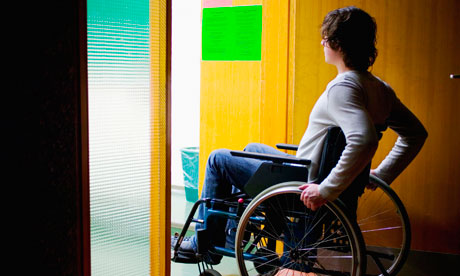
If someone can sit and propel a manual wheelchair, they are not eligible for the benefit, one trainer in the films explains. Photograph: Rex Features
Secret filming of training given to doctors recruited by the private company Atos to assess whether sickness and disability benefit applicants are fit for work suggests that staff are monitored to ensure they do not find excessive numbers of claimants eligible.
The footage will trigger a new debate over whether there are fixed targets for the number of people who should be granted the new incapacity benefit – the employment and support allowance – something the government and Atos, the company hired by the Department for Work and Pensions (DWP) to conduct the fitness for work tests, have consistently denied.
The film also demonstrates the unease about the radically heightened eligibility criteria felt by some trainers employed by Atos to teach new recruits how to carry out the tests. It is now harder for some very severely disabled claimants to qualify for support. No matter how serious claimants problems are with their arms, for example, “as long as you’ve got one finger, and you can press a button,” they would be found fit for work, a trainer explains.
Dr Steve Bick, a GP with 20 years’ experience, applied for a job as an assessor with Atos to carry out the work capability assessment (WCA), and secretly filmed his training for Channel 4’s Dispatches programme, which will be broadcast on Monday 30 July at 8pm. Undercover filming shows Bick being told by his trainer that he will be watched carefully over the number of applicants he found eligible for the highest rate of disability payments.
The trainer tells trainee assessors: “If it’s more than I think 12% or 13%, you will be fed back ‘your rate is too high.'” When Bick questioned how the company could know in advance the precise proportion of people who needed to be put in this category, the trainer replied: “How do we know? I don’t know who set the criteria but that’s what we are being told.”
Bick asked: “So if we put 20% in, we would get picked up on?”. He was told by the trainer that, in that scenario, his cases would be reviewed.
The DWP said it was unable to respond in detail to the programme’s findings because it had not been shown a full transcript, but a spokeswoman said it was “nonsense” to suggest there were targets or expected results of any sort. She said assessors’ results were monitored to make sure they adhered to an average, adding: “If individual Atos healthcare professionals record results considerably outside the average, their work may be audited to ensure quality. If no issues are found with the quality of work, no action is taken.”
In the footage, one of the trainers admits during a session that the auditing process makes her feel uncomfortable.
“It’s terrible sometimes, people having [problems with] both hips and both knees, but good hands. Terrible. And you know, we talk about modern work adaptations, but we know how it looks from the other side – there’s no jobs for normal people, healthy people. But we have to think this way and sometimes you feel awful because you can’t do anything for people. You can’t feel sorry and give them the money just because you feel sorry for them … you will go on targeted audit,” she says.
During the assessment, Atos health professionals, who can be doctors, nurses or physiotherapists, have to award claimants points reflecting the apparent severity of their condition, with information gathered through a computer-led set of questions. The data is typed into a computer program during the 20-minute session, and patients who score 15 points are likely to be found eligible for support, although the final decision is taken by jobcentre staff. Patients who score below 15 points are not likely to qualify for benefits.
In the film, the trainer highlights to new trainees the way that the new system has been altered so it offers less support to certain categories of claimants.
“For employment support allowance, we talk about mobilising, which means being able to transfer from point A to point B either by walking, walking with aids, which is crutches, walking sticks, Zimmer frame or using a manual wheelchair. So if someone has no legs but they have good hands, they can sit and propel a manual wheelchair, they don’t score anything. This is one of the toughest changes,” she says. “I’ve recently had somebody with prostate cancer, but of course that’s not traditionally treated with chemotherapy so I gave him no points. And I couldn’t do anything else…. Same with breast cancer: the hormonal treatments don’t count. So he was given no points, I felt very uncomfortable doing it and I didn’t like doing it, but I had no way of scoring him.”
Large numbers of people found ineligible for the benefit are appealing against the decision to find them fit for work; about 41% of those refused support go to tribunal and 30% are subsequently granted the benefit. There have been more than 600,000 appeals since the WCA started, costing about £60m a year.
The film also reveals Atos’s lack of accountability for these appeals. The trainer explains: “Good thing for us is, even if you made the wrong decision … you never go to the tribunal. So, sort of, you won’t be blamed.”
An Atos Healthcare spokesperson said: “It is simply and absolutely untrue that there are targets for the number of people to be assessed as fit-to-work; neither set by the Department for Work and Pensions nor Atos Healthcare. Every person we see is assessed individually with a focus on the facts of their own case.”
On Thursday, the high court granted permission to two disabled people to bring a claim for judicial review against the work and pensions secretary to challenge the operation of the WCA, on the grounds that it potentially discriminates against claimants with mental health problems.
guardian.co.uk © Guardian News & Media Limited 2010
Published via the Guardian News Feed plugin for WordPress.


7 Responses
If, say, an insurance policy was to be sold to people with those receiving the premiums having decided that regardless of merit only a small fixed percentage would actually get the benefits that their premiums had paid for then quite rightly this would be regarded as mis-selling just as it was with PPI and other schemes. The question is, in this case, whether the so called “arms length” operation of assessors working independently of those who have taken the premium (National “Insurance”) actually amounts to a criminal conspiracy to defraud the people who have made the payments when the time comes to make a claim. If it can be classified as such then those responsible will not be able to use the usual weasel words of “lessons to be learned” etc but will be facing a real chance of prosecution in the courts and it will soon come out who has been driving things.
Still, for all that the money taken from us is called “National Insurance” I have never seen a copy of the terms and conditions which say what is being insured or the terms under which payment has been taken. If anyone has it will be interesting to see whether they are being breached by this sort of alteration if not then surely, as with PPI, the guide ought to be that of what everyone thought they were paying for. This cannot possibly be like travel insurance where the last line of most small print carries the sort of warning that payouts are purely at the discretion of the company regardless of the merits of any claim, can it?
Mind you, if the authority for the quota came from the top of the DWP it would explain why a company has its employees sign the Official Secrets Act!
seems it all starting to unravel – for the evil atos and co – shall watch that program with interest
what is it they say “be sure your sins will find you out ” ?? – seems that lies work the same way
GOOD STUFF !!
Finally the truth. Targets set by government, ridiculous assessment criteria, a company not fit for purpose, and out of all of that much suffering for disabled and vulnerable people. It is time this company and this government were taken before a judge and tried for this criminal behaviour , let us hope the current case sees the beginning of the end for both the WCA and ATOS in their involvement in what is the most sickening indictment of our nation in 2012.
Very well said
No one should agree to be assessed unless it is recorded by Atos (as we have a right to request). I understand that they have a shortage of recording equipment, so insisting on this would throw the system into complete chaos – at least for a while until they fork out for enough equipment. I intend to ask the person doing my assessment to state (for the purpose of the recording) her name and her qualifications and whether she is qualified in my particular illness. I think these assessors should be made aware that if any legal action follows as a result of what is happening that they will be held responsible along side their employers and the DWP.
its about itme someone started to get the dirt on both the dwp atos goverment how they treat us and hope now that some who dont like the disabled will open their eyes and see its all been goverment lies pointing their fingers of hate whilst its them who have been doing it to us so should they the ministers be shown the door for all the back stabbing of the sick and disabled who they cant look in the eyes of truth is out there but they cant speak it jeff3
This is Sick and Evil . Politicians have their Expenses together with their Huge
Salaries so they are hardly Examples of Austerity
This is Cruel Vicious and shows the Need for this to be Done by NHS Doctors
Properly Qualified in this Matter and For the Con Dem Regime to Get Out of
Office as they are Not Fit to Govern this Country
If MPS were Assessed for their Ability to Perform any Service to the Decent
Government of the Country they would Overwhelmingly Fail